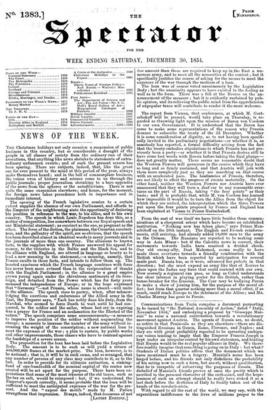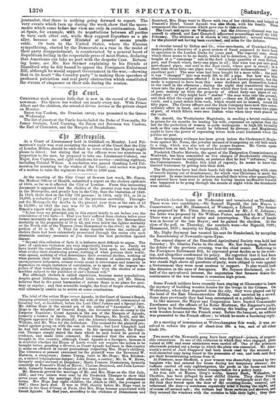Communications from Turin comprise a document purporting to be issued
by "the National Assembly of Action," dated "Italy, November 1854," and embodying a proposal by "Giuseppe Maz- zini" to raise a national contribution towards a revolutionary movement against A ustria. The agents of Russia are, no doubt, as active in that Peninsula as they are elsewhere—there are dis- tinguished Russians in Genoa, Rome' Florence, and Naples ; and they are with great probability reported to be spreading ambigu- eua voices tending to imply that. the Emperor Francis Joseph is kept under an irregular control by his own statesmen, and hinting that"Russis would be the real popular alliance in Italy. We there- fore readily imagine that something is going on in Italy : but what? Students of Italian polities affirm that the document which we hav mentioned mast be a forgery. Mazzini's name has been forged before, and his friends not only diihelieve the probability of his acting now in such a form, but assert;Wilhout qualification, that he is incapable of subserving the Purposes of Russia. The disbelief of Mazzini's friends proves at once the purity which is ascribed to the personal character of the enthusiast, and the hope- lessness of such an attempt should he really have risked it as a last dash before the destinies of Italy be finally taken out of the hands of the revolutionists.
With regard to all the rest of the world, we may say, with the supercilious indifference to the lives of Millions proper to the
journalist, that there is nothing going forward to report. The very events which turn up during the week, show that the move- ments which come before eur view are only im continuation. Leek at Spain, for example, with its negotiations between all parties. to turn- each other out, while they support Espartero, as a pis alter, because no other liiinieter at present seems practi- cable. Or turn to the United States, where the Russian sympathizing, started by the Democrats as a ruse in the midst of their party disappointment, is counteracted by a general burst of Republican feeling in the respectable press of most States, declaring that Americans can take no part with the despotic Czar. Return- ing home, see Mr. Ker Seymer explaining to his friends at Blandford why he felt bound to oppose the Foreigners Enlistment Bill, although he would support Government in the war,—showing that in its heart "the Country party" is making those speeches of professed patriotism and real party obstruction which constituted the stream of eloquence on their side during the session.



























 Previous page
Previous page